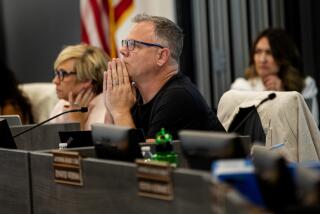Fellow Jurists Oust Presiding Judge Thomas
Embattled Los Angeles Municipal Judge Maxine F. Thomas was dethroned from her post as presiding judge in an overwhelming recall vote Wednesday night.
By a 57-13 tally, with one abstention, fellow justices ousted Thomas from the administrative position, reported Judge James F. Nelson, who chaired the hourlong recall session attended by all but nine of the court’s 80 judges.
Under the court’s rules, Assistant Presiding Judge George W. Trammell automatically succeeds Thomas, who began her one-year elected term in January, Nelson said. Thomas retains her position as a municipal judge.
“We can get back to business as a court. Division will cease. Unity will prevail,” predicted Nelson, himself a former presiding judge.
Minutes later, however, Thomas told reporters that she is considering legal action against her fellow jurists in an effort to retain the court’s top post.
“I’m not giving up,” said Thomas, who maintained a smile throughout a brief press conference in her office. “I’m going forward to continue fighting this matter.”
While expressing disappointment in her fellow jurists’ apparently unprecedented vote, Thomas, 39, added that she will also move forward with her candidacy for a Superior Court judgeship in the November election. Thomas, the first black woman to become a presiding judge, had been criticized by fellow jurists in recent weeks for allegedly using the position to enhance her current election campaign.
The judge’s critics, who have spoken to the media under the condition that they remain anonymous, also have attacked Thomas for allegedly rewarding her friends with choice bench assignments and for staging an unprecedented $2,900 installation ceremony for herself, which has become known in court circles as “Maxine’s Coronation.”
In recent weeks, the opponents charge, Thomas has neglected her duties in favor of campaigning.
Thomas maintained to reporters that she was ousted because of misunderstandings and falsehoods spawned and perpetuated by several of her colleagues. She added that her peers had discriminated against her, since critics did not air their specific grievances prior to Wednesday’s secret balloting.
But several judges who were at the closed meeting said that no list of specific charges was necessary, since the rules of the court do not call for a formal impeachment proceeding to remove a presiding judge.
“She brought that up (at the session) and the answer several judges aired--and I feel is the proper answer--is that . . . this is a recall and you don’t need to have charges leveled and proved,” Trammell said. “She held the office at the will and the pleasure of the judges of this court . . . and they have the right to revoke that.”
Trammell said he would assume the duties of presiding judge this morning, administering the court’s day-to-day operations, assigning judges to courtrooms and cases.
Thomas, meanwhile, said she would meet with her attorneys “bright and early” before deciding how to proceed.
“When the going gets tough, that’s when the tough get going,” she said. “ . . . I have a done a good job as presiding judge. And I would certainly stand on my record.”
In a last-ditch attempt this week to prevent the recall, Thomas had demanded that the vote be delayed until late July in order that she could be provided with a list of specific charges.
A letter to the judges, signed by her co-counsel Godfrey Isaac, stated that an immediate vote would “constitute arbitrary, prejudicial and discriminatory action” against Thomas.
Thomas’ critics, however, labeled the letter they received Tuesday an intimidation tactic.
Immediate Motion
At the closed-door session, sources reported, an immediate motion was made by Judge Sidney Cherniss to remove Thomas so that a judge other than Thomas could be selected to preside over the meeting.
Prior to the recall balloting--in which only 41 votes were needed to oust her--Thomas said she unsuccessfully asked her critics to discuss their grievances. Thomas, however, did not make a detailed presentation concerning the reasons she felt she should not be recalled, according to judges who were present.
After the 71 jurists cast their votes on blank pieces of paper, the ballots were counted by the court’s three senior judges, Mary E. Waters, Harold J. Sinclair and Edward L. Davenport.
The recall hearing took place after a petition signed by 42 of the court’s 80 judges was presented to court officials last week. The petition simply stated that the signers were calling “a special meeting . . . to consider whether the presiding judge should be removed from office.”
Signers of the petition included a cross-section of jurists, ranging from former Presiding Judges Sherman W. Smith and Malcolm H. Mackey, to Assistant Presiding Judge Trammell, to minority group members--including black judges Smith, Veronica Simmons McBeth and Candace D. Cooper.
The judges who signed were also from various Municipal Court facilities, including the downtown Criminal Courts Building, the downtown Civil Courthouse, and branch courts in Van Nuys, West Los Angeles and Encino.
Thomas, who will face Burbank Municipal Judge Bernard Kaufman in a November runoff election, was recently rated “not qualified” for the Superior Court by the Los Angeles County Bar Assn., which stated that Thomas lacked the “judicial ability and judgment” needed for the job.
Thomas, a one-time corporate attorney and college beauty queen, was named to the bench in 1980 by then-Gov. Edmund G. Brown Jr. After losing two campaigns to become assistant presiding judge, she was elected to the court’s second spot in 1984. As is traditionally the case, Thomas was elected to the presiding judge’s post a year later.
Staff writer Edward J. Boyer contributed to this article.
More to Read
Sign up for Essential California
The most important California stories and recommendations in your inbox every morning.
You may occasionally receive promotional content from the Los Angeles Times.










